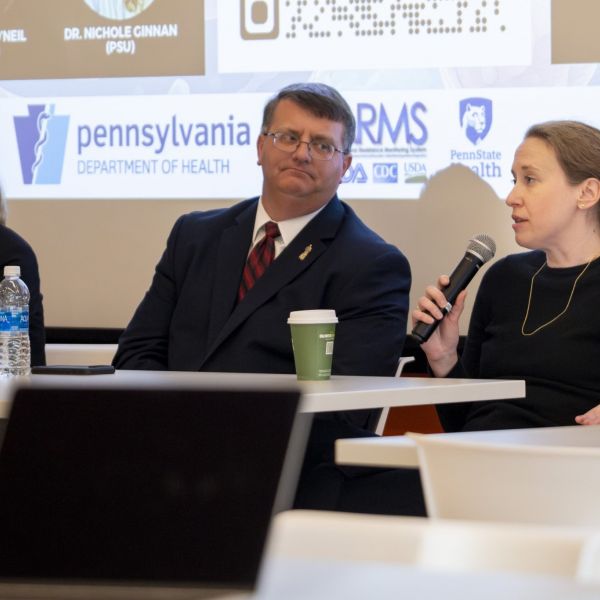Dec 13, 2023
Antimicrobial Resistance Awareness Day Sheds Light on Crucial Health Challenge
On November 30, the One Health Microbiome Center brought together a multidisciplinary group of clinicians, experts, and researchers to discuss the issue of antimicrobial resistance, a major public health challenge.

UNIVERSITY PARK, Pa. — On November 30, 2023, the Penn State One Health Microbiome Center hosted its first ever Antimicrobial Resistance Awareness Day. Led by Erika Ganda, assistant professor of Animal Sciences, and Samantha Seibel, a graduate student in the Molecular, Cellular, and Integrative Biosciences program, the event was developed as a collaborative effort with the Pennsylvania Department of Health and the College of Medicine to bring animal, human, and plant health experts to discuss antimicrobial resistance (AMR), an essential public health issue in which microorganisms adapt to grow in the presence of drugs that once killed them.
The theme, "Tackling Antimicrobial Resistance from Diverse Perspectives: Social Science, Human Health, Animal Health, Plant Health, and Policy," aimed to provide a comprehensive understanding of the multifaceted challenges posed by AMR. With a varied lineup of panelists, the event delved into the complexities of this global health concern and the projected adverse effects on healthcare costs, livestock productivity, and global flows of trade and travel.
Leading the discussions was Dr. Paul Plummer, executive director at the National Institute of Antimicrobial Resistance Research and Education (NIAMRRE) and associate dean of research at the Iowa State University College of Veterinary Medicine. Plummer, who also chairs the Presidential Advisory Council on Combating Antibiotic-Resistant Bacteria (PACCARB), emphasized the importance of interinstitutional and intergovernmental collaborative efforts in the fight against AMR.
Medical Director of Penn State University Health Services Dr. Rebecca Simcik shared insights into the impact of AMR on human health, stressing the need for responsible antibiotic use. Associate Professor of International Affairs Elizabeth Ransom contributed a valuable perspective on the social science aspects of AMR, emphasizing the interconnectedness of human, animal, and environmental health.
Heather Tate, an epidemiologist from the FDA Division of Emerging Technologies, highlighted the One Health approach that the National Antimicrobial Resistance Monitoring System for Enteric Bacteria (NARMS) is utilizing to survey and respond to AMR. Dr. Jessica O'Neil, an infectious diseases fellow from the Hospital of the University of Pennsylvania, brought the clinical perspective to the table, discussing challenges faced in treating infectious diseases in the era of AMR.
Completing the panel was Nichole Ginnan, research project manager at the Penn State One Health Microbiome Center and member of the Pennsylvania One Health Taskforce’s AMR sub-committee, who shed light on ongoing research initiatives and the importance of a One Health approach in understanding and addressing AMR in crop production.
“Growing fungal pathogen resistance to crop fungicides is a major concern for maintaining plant production, as well as animal and human health,” said Ginnan. “Currently, there is no alternative to replace chemical fungicides completely, but advances in integrated pest management, which combines chemical and non-chemical applications, such as microbial biological controls, are helping to reduce chemical inputs.”
The in-person attendees comprised a diverse audience, representing various departments in the Colleges of Liberal Arts, Engineering, Science, and Agricultural Sciences. Practicing clinicians from Penn State University Health Services, Penn State College of Medicine, and representatives of the Pennsylvania Department of Health joined faculty and students from Anthropology, Arts, Engineering, Food Science, Animal Science, and Entomology, among others. The event, held both in person and on Zoom, reached a broad audience, including participants from the University of Puerto Rico—emphasizing the global impact and collaborative nature of efforts to combat AMR.
“Only together through the One Health approach will we find lasting solutions to the complex problem of antimicrobial resistance," said Dr. Nicole Hackman, medical director for lactation services at Hershey Medical Center. "I found it fascinating to learn more about plant and animal science and their intersection with human medicine. I am looking forward to future collaborative events.”
“Although it is an ancient natural process, the increase in antimicrobial resistance is exacerbated by reversible human actions," said Nkuchia M. M’ikanatha, an epidemiologist with the Pennsylvania NARMS. "Observance of the Antimicrobial Resistance Awareness Week with a One Health Perspective is an effective strategy to strengthen a need for multidisciplinary efforts to slow a growing major threat.”